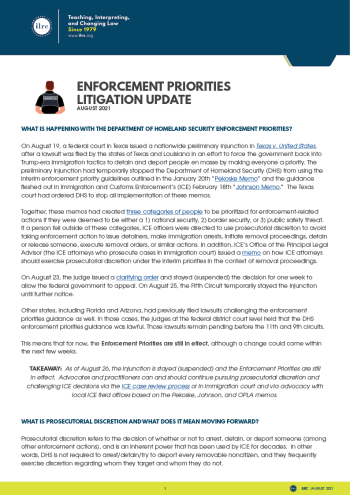
There have been many recent developments regarding the litigation challenges to the Department of Homeland Security enforcement priorities. This brief guide provides a quick summary to help you keep up. In short, the Enforcement Priorities are currently still in effect, although a change could come within the next few weeks. Below you will additionally find the Fifth Circuit’s temporary stay of the lower federal district court’s preliminary injunction order. While these issues are quickly moving, this update is current as of September 2021.
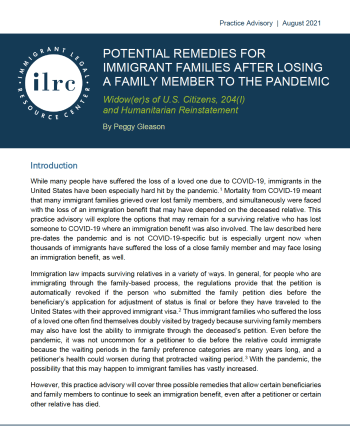
Mortality from COVID-19 meant that many immigrant families grieved over lost family members, and simultaneously were faced with the loss of an immigration benefit that may have depended on the deceased relative. This practice advisory will explore the options that may remain for a surviving relative who has lost someone to COVID-19 where an immigration benefit was also involved. The three possible remedies are: Survivor benefits for widow(er)s of U.S. citizens (USCs) under INA § 201(b)(2)(A)(i); other benefits for certain surviving relatives under INA § 204(l); and humanitarian reinstatement of an approved I-130 petition.

The Liberian Refugee Immigration Fairness Act (LRIF) created a limited-term program allowing many Liberians living in the United States to apply for permanent residence. Initially, LRIF’s application period opened on December 20, 2019 and was set to expire on December 20, 2020. On January 3, 2021, however, Congress passed the Consolidated Appropriations Act 2021, extending the application period for LRIF for another year, until December 20, 2021.
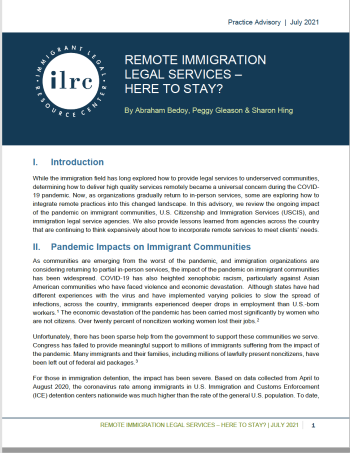
While the immigration field has long explored how to provide legal services to underserved communities, determining how to deliver high quality services remotely became a universal concern during the COVID-19 pandemic. Now, as organizations gradually return to in-person services, some are exploring how to integrate remote practices into this changed landscape. In this practice advisory, we review the ongoing impact of the pandemic on immigrant communities, U.S. Citizenship and Immigration Services (USCIS), and immigration legal service agencies. We also provide lessons learned from agencies across the country that are continuing to think expansively about how to incorporate remote services to meet clients’ needs.
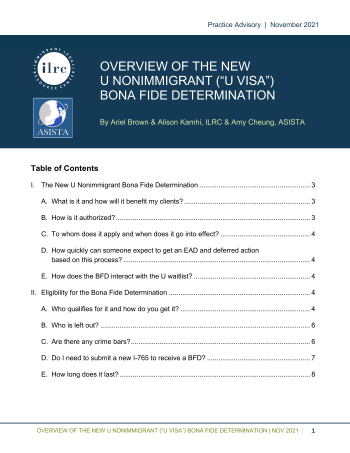
On June 14, 2021, USCIS announced a new “bona fide determination” process whereby certain U petitioners and their family members with pending U petitions can receive four-year work authorization and deferred action while they wait for full adjudication. This process could be very good for many of the 270,000 folks who have filed for a U visa and are waiting – but there are many folks left out, and of course, much of this depends on how the process is implemented. ILRC and ASISTA wrote this advisory to provide updated information on the new process and discuss eligibility, decisions and renewals, and other issues.
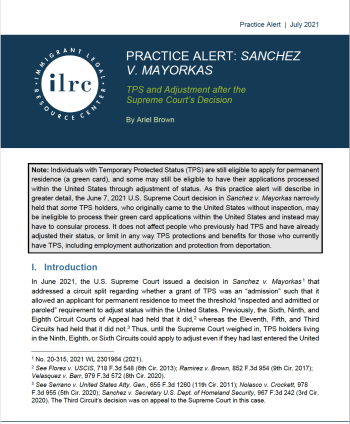
In June 2021, the U.S. Supreme Court issued a decision in Sanchez v. Mayorkas that addressed a circuit split regarding whether a grant of TPS was an “admission” such that it allowed an applicant for permanent residence to meet the threshold “inspected and admitted or paroled” requirement to adjust status within the United States. Previously, the Sixth, Ninth, and Eighth Circuit Courts of Appeal had held that it did, whereas the Eleventh, Fifth, and Third Circuits had held that it did not. In Sanchez, the Supreme Court found that a grant of TPS is not an “admission” for adjustment purposes. This practice alert provides a brief summary of the Sanchez decision, discusses who is and is not impacted by the decision, and provides some suggestions for next steps and other resources.
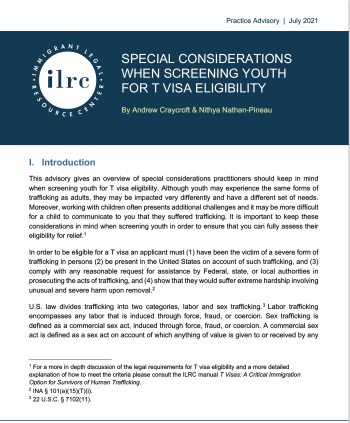
T visas are a crucial but often underutilized form of relief for youth who have survived trafficking. This advisory gives an overview of special considerations practitioners should keep in mind when screening youth for T visa eligibility. It gives helpful tips that practitioners can use to ensure that they fully assess a child’s eligibility while minimizing retraumatization.
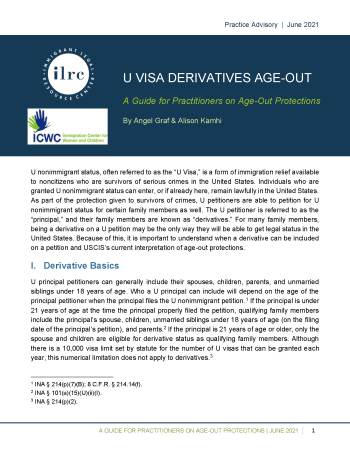
For many family members, being a derivative on a U petition may be the only way they will be able to get legal status in the United States. Because of this, it is important to understand when a derivative can be included on a petition and USCIS’s current interpretation of age-out protections. ICWC and ILRC wrote this advisory to address a changed interpretation of age-out protections for U visa derivatives.
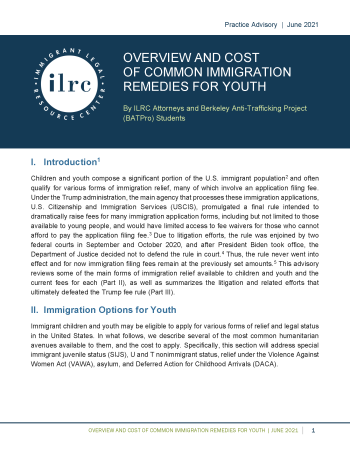
Children and youth compose a significant portion of the U.S. immigrant population and often qualify for various forms of immigration relief, many of which involve an application filing fee. Under the Trump administration, USCIS promulgated a final rule intended to dramatically raise fees for many immigration application forms, including those available to young people, and would have limited access to fee waivers. The rule was blocked by federal courts, and after President Biden took office, the Department of Justice decided not to defend the rule, so it never took effect and for now immigration filing fees remain at the previously set amounts. This advisory reviews some of the main forms of immigration relief available to children and youth and the current fees for each, and summarizes the litigation and related efforts that ultimately defeated the Trump fee rule.

California has passed four bills in recent years concerning access to the U visa, an important form of immigration status. Although the federal government decides who receives a U visa, the state can increase access to the remedy by creating processes for noncitizens to obtain a U visa certification from law enforcement, a necessary part of the U visa petition. All of the bills address U visa certification. This advisory describes the California bills, who they apply to, and how practitioners can use them to advocate for U visa clients.